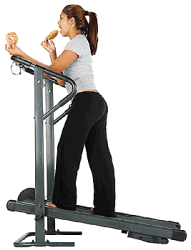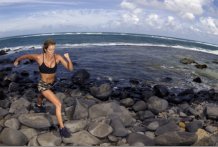Eating and Exercise: Should You Eat After Exercising? Before? How Long and What?
by www.SixWise.com
Many of us grew up with the strict advice to wait
at least one hour after eating to go swimming -- or else
we'd be stricken with severe cramps and inevitably sink to
the bottom.
|

Eating a small snack about an hour before your workout
may help give you energy, as long as it's something
high in carbs and low in fat (like a piece of fresh
fruit and a mini whole-grain bagel).
|
Now that we're grown, many of us are still holding on to
the notion that we shouldn't eat anything before we exercise.
Meanwhile, many of us don't take the time to stop and eat
something after
we workout either, but should we?
Eating Before Exercise: Should You?
Your body needs fuel (i.e. food) to make it through your
workout, but too much of it can actually slow you down. So
when it comes to eating and exercise, timing, quantity and
the type of exercise you're doing make all the difference.
Here are the major "rules" you need to know:
-
If you exercise first thing in the morning, get up early
enough (two to three hours ahead of time) to eat a full
breakfast. If you only have an hour to spare you should
still eat something, just make it a light snack.
-
You should wait to exercise if you've eaten a
large meal (at least three to four hours, but sometimes
up to six, is required). This is because it takes your
body some time to digest a large meal, but intense exercise
slows your digestion (and instead diverts energy to your
muscles). The result could be cramping, an upset stomach
and diarrhea. If you've eaten a small meal, you should
still wait two to three hours before working out intensely.
-
Experiment with snacks. For some people, a small snack
(like a banana) right before, and even during, exercise
provides an energy boost. For others, it can make them
feel lightheaded. You should do whatever feels good to
you.
Meanwhile, when it comes to eating before exercise, the type
of food, and your workout, is important. If you are going
to be doing high-intensity activity (such as running, aerobics
or kickboxing) you need to give yourself a longer lead time
for your food to digest.
On the other hand, if your workout is going to be more gentle
(a long walk, for instance) you can get away with eating closer
to your workout time.
You should refrain from eating foods high in fat prior to
your exercise, because these foods will stay in your stomach
longer (and could upset it). Foods that are high in fiber
should also be avoided, as they could stimulate your digestive
system when your energy is needed elsewhere.
|

How long you need to wait before exercising after eating
also depends on the intensity of your workout. You should
give yourself longer to digest if you're going to be
working out intensely (running, aerobics, etc.) than
if your workout will be more gentle (walking).
|
Instead, foods that are high in carbohydrates and moderate
in protein will satisfy your hunger, be easily digested and
help normalize your blood sugar, so you feel at the top of
your game come workout time.
Examples of good before-workout snacks include:
-
Fresh fruit and a small amount of almond butter
-
Low-fat soup (vegetable, chicken noodle, etc.)
-
A whole-grain bagel with whole-fruit jelly
-
A banana and yogurt
Should You Eat During Your Workout?
If you are going to be working out intensely for an extended
period of time (over one hour), your body will likely need
to be replenished to avoid getting tired. A small piece of
fruit or a sport's drink would suffice (but keep in mind that
sport's drinks often contain added
sugars, artificial flavors and artificial colors).
However, most of the time just drinking water is enough to
keep your body going during your workout.
After Workout Eating Tips
Exercise, though incredibly good for your health, puts stress
on your body. Eating the right foods after you exercise is
essential to helping your muscles recover and replace their
glycogen stores for energy. This is especially important if
you work out intensely or often (daily or more).
You should eat carbohydrates (such as a piece of fruit, raw
veggies or whole-grain crackers) as soon as possible after
exercising, and eat some protein (a hard-boiled egg, nuts,
turkey, chicken, etc.) within two hours of your workout.
Though you may not be in the habit of paying attention to
what you eat before and after your workout, doing so can help
you get the most out of your exercise. Experiment with different
foods and timing and you'll easily find the combination that
feels best for your body.
Recommended Reading
The
10 Keys to Start an Exercise Program -- and Finally Stick
to It!
What
to do AFTER a Workout to Get Maximum Benefit From Your Exercise
Sources
ESPN
Sports Nutrition
The
Mayo Clinic